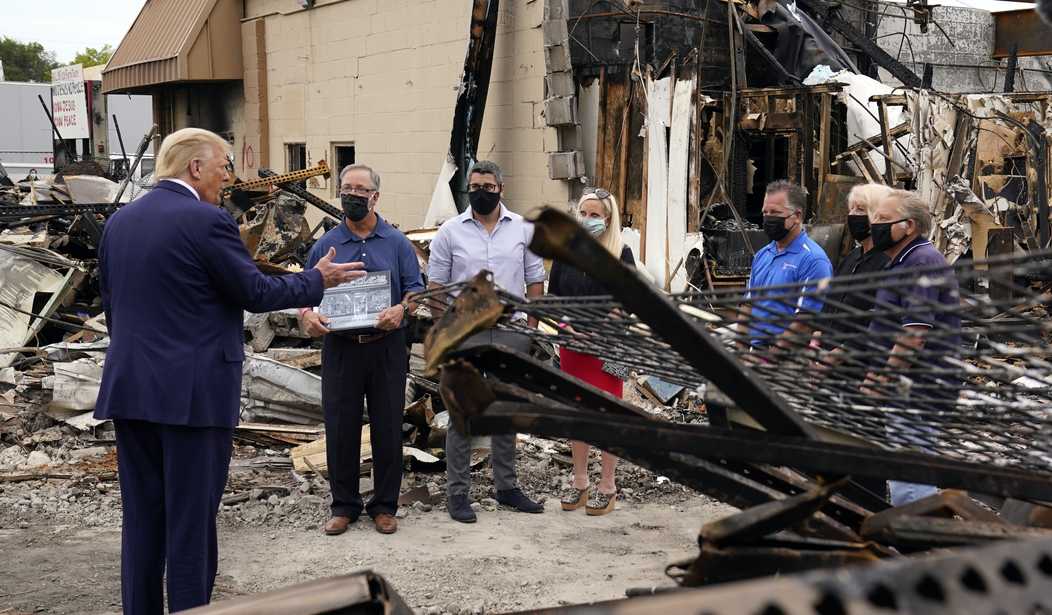You can understand why Democrats didn't want President Donald Trump to visit Kenosha to respond to last week's mob violence, looting, and arson.
They're embarrassed. They're worried about the election in a few months. It's getting close, and Democrat Joe Biden's lead in key Midwestern swing states is shrinking.
Trump is trying to take advantage of their weakness. He's the president. He's in a campaign. And if he had not visited Kenosha, he'd be guilty of political malpractice.
He applauded the cops there for restoring order to the city that had burned, talked to business owners who lost everything, and brought with him $47 million in federal money to rebuild ruined businesses and bolster law enforcement.
"You may have (peaceful) protesters, but you may have really bad people too," Trump told reporters during a brief question and answer session. "It's hurt the media ... someone saying it's a peaceful protest and over their shoulder the whole place is burning down."
Urban violence has been building for some time. And despite what Democrats say now, it did not begin with Trump.
Republicans don't run the public schools in these cities where special interests, including public schoolteachers' unions, are served first and the kids come last. Republicans don't impose high taxes that kill business development where it's needed most, in economically depressed urban areas. Democrats control their police departments.
In Chicago, Baltimore, Detroit, Oakland, Portland, Washington and elsewhere, the Democrats rule.
And the road to urban despair was paved over decades and decades, by failed Democratic policy, as I wrote in 2016.
Recommended
What we see now -- and what some Democrats have tried to avoid since violence erupted after the Minneapolis police killing of George Floyd -- are liberal Democratic mayors being devoured by the hard left.
That's the real conflict. Democrats don't want to say so, publicly, because they're all about unity now. They've been trying to distract the voters from the division among Democrats, and one way to do it is to feed chaos and ride it like a tiger.
They've been riding that tiger since Trump was elected, trying to delegitimize his presidency from the beginning, through the failed Mueller investigation of alleged Russia collusion that consumed years of Trump's presidency, and the failed presidential impeachment. Democrats were successful in politically weaponizing the coronavirus, due to Trump's early blunders and boasts that he'd handle it in a couple of days.
Then came urban violence, and Democrats sought to use it for their advantage. They miscalculated. Polls began turning.
But anarchy isn't policy. Anarchy is chaos, and chaos frightens voters.
Think back a few years ago, to U.S. Rep Maxine Waters, the California Democrat, trying to take things to the edge of anarchy, with angry confrontations, and the use of chaos as a ladder.
"If you see anybody from that (Trump) Cabinet in a restaurant, in a department store, at a gasoline station, you get out and you create a crowd, and you push back on them, and you tell them they're not welcome anymore, anywhere," Waters said in 2018.
Democrats didn't criticize her. She was their hero. What she wanted grew. Just the other day, U.S. Sen. Rand Paul and his wife were surrounded by an angry Jacobin mob on the streets of Washington and much of the country saw it.
A few weeks ago, in July, U.S. Rep. Jerry Nadler, a Democrat, was asked about antifa violence in Portland. "It's a myth," Nadler said.
A myth?
The violence in Portland has been going on for months. Just the other day, a Trump supporter in a counterprotest was killed. The defiant mob rioting outside Portland Mayor Ted Wheeler's home the other night isn't the stuff of myth, Mr. Nadler. It's the stuff of chaos.
Much of the violence in cities was sparked by the police shootings of Black men, the police killing of Floyd in Minneapolis, the shooting of Jacob Blake by police in Kenosha, the police killing of Rayshard Brooks in Atlanta.
These are legitimate reasons for angry protests, something many Republicans, including Trump, try to minimize, even avoid.
In the balance, now, are swing voters in the key battleground states. Trump promises to protect them, and Biden blames Trump for any anxiety they may feel.
Most Americans decry police brutality. They want police reform. But they also want safety.
Now Wisconsin could be in play. Minnesota too. That blue wall the Democrats had in Minnesota seems threatened, after the riots in Minneapolis and liberal city officials caving to the calls of Black Lives Matter protesters to defund the police department. And Pennsylvania also is a battleground state.
That's where Joe Biden visited the other day. He made a short speech, condemning Trump. Unlike Trump, Biden won't take questions. His handlers know him well and must be afraid of what might come out of his mouth.
But he can still read a speech. Unfortunately, he read this line.
"Does anyone believe that there will be less violence in America if Donald Trump is re-elected?"
That doesn't sound like a man seeking to calm his nation. It sounds like the threat of a man worried about a tightening election, promising more chaos if Democrats don't get what they want: power.

























Join the conversation as a VIP Member